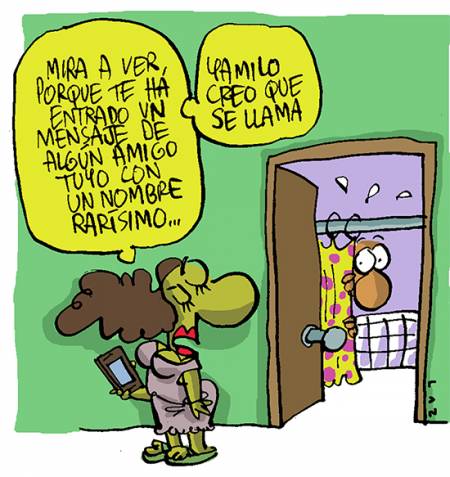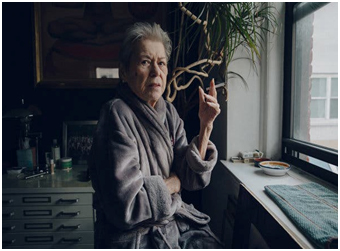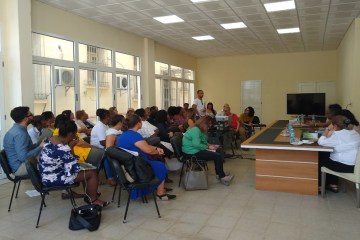Sexuality 8
What are you faithful to?

What are you faithful to?
The mysterious and not-so-mysterious motivations behind infidelities are revealed by psychologist Esther Perel, after years of studying intimacy among couples.
Author:

Mileyda Menéndez Dávila | sentido@juventudrebelde.cu
Published: Friday 07 April 2017 | 09:46:07 pm. Updated: Friday 22 September 2017 | 12:38:34 am.
Translated and edited by Walter Lippmann for CubaNews.

Infidelity Author: LAZ Published: 09/21/2017 | 06:53 pm
The bonds of wedlock are so heavy that it takes two to carry them, sometimes three.
—Alexandre Dumas, père
Being unfaithful has a tenacity that every marriage would envy. Its charm lies in the forbidden, but also in the intoxication of capturing a new passion, just as when the betrayed relationship began.
This is revealed by Esther Perel, a Belgian psychologist specializing in couples’ intimacy, who is visiting Cuba these days and agreed to give a series of talks on the future of femininity, an initiative of the Abanico project and its producer, Rafael Lavín.
Monogamy is concretized on a daily basis, but reality is a small portion of the human mind, where fantasy has much more space. That is why those who cheat almost never have the intention of hurting, says the expert.
More than distancing oneself from one’s partner or seeking pleasure from others, what is longed for is one’s own essence, what was left behind when assuming an exclusivity based on love, although desire is what drives these types of choices.
When it comes to light, what hurts most is not the contact with other bodies, the time or the resources “diverted” from the common desire, but the betrayal of that idealized mission to build the unique, indispensable and irreplaceable love that led them to unite in the first place.
But therapeutic practice confirms that after having an affair, many people reinforce their interest in their stable bond, improve their erotic commitment, and are ready to make up for it in a thousand ways.
Facebook that does not see…
In this digital era, it is easier and at the same time more difficult to hide infidelities. On social networks, you can meet many people, but there is also more risk of being caught in the crossfire.
Today a woman who decides to forgive is not looked at with the same condescension because there are more facilities to not depend economically on anyone and she can have all the sex she wants, says the expert. If it were not for this social pressure (always exerted on men), many people would recognize that their love is even stronger than disenchantment and would give their story another chance.
Esther is neither for nor against infidelity. Each case is a lesson and it takes courage both to break up and to rewrite the plot.
She shares two keys to achieve this: the first is that the unfaithful partner sincerely regrets the damage done to his or her partner, even if he or she does not feel remorse for the experience, and the second is to approach the conciliatory dialogue not from the sordid details (who, where, how), but from what they have learned about their own bond: Why you? Why us? What did you feel when you saw me every day? What did you discover about yourself? How do we get out of this together?
Passion vs. contract
Marriage has been, and still is in some ways, an estate agreement: which family to nurture and who gets the assets in the event of death or breakup. That is why the magnitude of the deception depends both on what is done and how it is received by the other party.
If infidelity were generated because something is missing within a relationship, all marriages would be condemned to suffer it, because no one always has everything for the other: the couple is built between two imperfect beings who dream of something dialectically superior and live in permanent challenge, negotiating power and seduction inward and outward.
The unfaithful person violates the collective faith in a romantic model that we still defend, and that violation does not begin when he gets into another bed but before, from the chatting, the compliment in the street, the gesture of attention towards other people….
It is said that men are unfaithful for fear of commitment and women for hunger of intimacy, but life is a more complex equation, especially now, that we do not marry to have sex with someone, but to stop having sex with other people, Esther points out.
Even in open couples there are clear rules about when, where or with whom you can’t experiment, but going beyond the contract is exciting: transgressing the limits gives a sense of autonomy and can become addictive, no matter how traditional or modern the couple is.
Sexual alchemy is important in this experience. After a certain time, a few minutes of fantasy sex generates more endorphins than the daily exchange with your partner. In surveys carried out in different countries, the
Esther Perel: Happiness is in the balance


Happiness is in the balance
The human couple is like a microcosm where cultural ideas penetrate and then pass to the children. A kind of portal in space and time that, like everything that responds to society, usually changes its model as the times change.
Author:

Mileyda Menéndez Dávila |sentido@juventudrebelde.cu
Published: Friday 13 April 2012 | 08:52:24 pm. Updated: Thursday 21 September 2017 | 09:34:28 pm.
Translated and edited by Walter Lippmann for CubaNews.

Desire is fire, and to grow it needs space. Author: internet Posted: 09/21/2017 | 05:19 pm
“Sexuality is a window to enter society,” says Belgian psychologist and anthropologist Esther Perel, with whom we spoke last January during the Sexology 2012 congress.
This New York-based therapist defines the human couple as a microcosm where cultural ideas penetrate and then are passed on to the children. A sort of portal in space and time that, like everything that responds to society, tends to change its model as the times change.
In her opinion, modern marriage left behind the old sexuality of reproduction and obligation to open the way to a new sexuality centered on erotic desire and governed by principles forged with Romanticism, that cultural movement that transformed the world from the 17th century onwards.
However, that romantic notion of the “passionate marriage” that is so much pursued today carries in its essence a historical contradiction: passion and commitment is a dialectical pair that we try to reconcile in order to satisfy in one person very different needs, such as adventure and stability, surprise and comfort.
“Today we women ask for more… and we divorce more because we get disillusioned very quickly. Although we still see a partner as a partner to raise a family and achieve economic security, in this century we are looking above all for our man to be our friend, our lover, our confidant.”
Modern women lead a life more open to individual projects, to social protagonism, to the decision to have fewer descendants and to fulfill themselves outside the home, but this takes a heavy toll on their intimacy, she says.
“It is an existential dilemma that all couples who manage to be stable go through: eroticism is our way of feeling alive, but without realizing it, we redirect it towards those who follow in our footsteps in the family and we neglect our erotic world,” she says.
“Many women stop grooming themselves to look beautiful, but they get satisfaction from watching their daughters do it. Others stop ‘taking care’ of their husbands to be jealous of their teenage son, and most adult married couples barely organize outings a couple of times a year, yet financially and materially support the weekly recreation of their young offspring.”
Sexually “savvy”
Esther has traveled to dozens of countries studying couples in their own historical and cultural context to try to answer those questions that everyone has ever asked: “Why is the forbidden so erotic, and after it is obtained it no longer excites us? Why is everyday sexuality, done with love, usually not as passionate as a casual encounter? Why does sex make children, and then children kill sex?”.
In fluent Spanish and full of metaphors, Esther talked to several Cuban journalists about the success of her book Erotic Intelligence, published since 2007 by several publishing houses, in which she tries to discuss these questions. [In English, the book is called Mating in Captivity]
According to what she told us, the term came up as a joke from her husband (she has been married for 30 years), but then they both made sense of it: if we are already talking about emotional intelligence, why not accept that sex demands its own share of knowledge and intuition?
In this day and age, a sexually “intelligent” woman with a secure attachment style looks for men who want her, not need her.
The difference is easy to detect, Esther assures: “In the first case they say “I love you”, while in the second case they ask “Why don’t you love me?”, even when you have given all the proof of love they have asked for throughout the relationship… And this is also true the other way around: emotionally dependent women who demand too much from their partners.
The diversity of manifestations of this dependence is above all cultural: in women, open complaint predominates; in men, it is more hidden or it emerges with a lot of aggression, especially in countries with a macho tradition.
Desire is fire, and to grow it needs space. Things will go better in many marriages when they understand that this is not a conflict to be resolved, but a paradox to be managed, like so many in this century: “You can be happy in a stable marriage, but the way to that happiness is the balance between individual freedom and mutual commitment”.
Be smart with your partner
If you want to apply erotic intelligence to your life as a couple, here are several tips discussed on the Terra site as a marital “survival list”:
-Be interested in your partner’s hobbies and show him/her what you like.
-Remember that you are not Siamese twins, you don’t have to go everywhere together.
-Work activities must be compatible for life as a couple.
-Avoid erosion in communication: get out of the house to talk about intimate things.
-Don’t fight against your partner’s quirks, incorporate them into your routine.
-Don’t try to change the other person, accept their bad side along with their good side.
-Balance the balance of roles, don’t try to be always and both the dominant voice.
-Put yourself in your partner’s shoes before judging why he/she acts one way or another.
CUBA AHORA interviews Esther Perel

Esther Perel: “We have started to control the body, to control sexuality”
Interview with Esther Perel, psychotherapist and specialist in couples therapy, who participates in the 6th Congress of Education, Orientation and Sexual Therapy….
By MARTA MARIA RAMIREZ
January 23, 2012
Translated and edited by Walter Lippmann for CubaNews.
Esther Perel is a psychotherapist and specializes in couples therapies. Born in Belgium, she studied in Israel and has her practice in NY where it seems she has many celebrities as patients.
Talking with Esther Perel is a privilege. Her personal story, as the daughter of Polish Jewish Holocaust survivors, refugees in Belgium, could be the plot of a novel or a movie.
But today we talk about the couple, after the workshop “The dilemmas of desire and clinical work with couples”, which she offered to specialists at Havana’s Casa de la Amistad on Saturday, January 21.
On Monday January 23, Perel will conduct the workshop “Emotional intelligence, erotic intelligence: new conversations about the sexuality of life in couples.”
What is the body for Esther?
It is the house in which we live. Some of us live well because it is a house, which has been respected, caressed, cared for, and which we care for.
Others see it as the central place of our inhibitions, restrictions and it turns out to be a prison. But the body is the foundation: if you are not inside your body, you are not present and to have desire or satisfying sex, you have to be present and your partner too.
If the body is dissociated, you are not there. If the body is not a place where you want to invite someone, where you are going to enter, because you don’t just enter an orifice, you enter a person, a world, a space.
For me, the body that enjoys, that feels good, is a base. At the same time, the most important sexual organ is the mind.
So, are the images of ideal women presented to us by the mass media a place of torture also for our sexualities?
It is torture for women that is expanding also to men, in consumer societies, where youth and beauty can be bought.
Since always, in every civilization, the body has been adored, decorated… This is not new. But the idea is that if you are not the ideal model, you have to feel less, diminished, because you don’t make it. That is slavery.
This is a way to control and every society controls sexuality, abstinence and license. We can no longer control so much what people do sexually, so we have started to control the body, how it dresses, how it takes care of itself, how it beautifies itself.
How does Esther see sexual pleasure? For you, is it a sexual right?
I never thought of pleasure as a right. But I am interested in this point of view. It seems logical to me.
I see pleasure more as a fundamental need in life. Not only sexual pleasure, to have pleasure, to enjoy, to feel alive.
Pleasure is the antidote to anxiety. It is play. When we see a child who does not play, we say that he is depressed, that he is anxious and that he is not living well. Adults also need to be able to play and have pleasure.
Sexual pleasure is a part of sexuality, a sexuality of desire, not of reproduction or obligation. So, desire comes with pleasure.
Why do we tend to deprive ourselves of pleasure, even though our sexuality, after the appearance of the contraceptive pill, is no longer for reproduction?
We are the first generations to have and want long-lasting sex. We think it can be achieved with only one person, based on the modern couple model, which is romantic. We want sex anchored in desire and this is, fundamentally, an expression of individual freedom.
As a consequence, pleasure cannot be forced; yes, sex. There is no pleasure without freedom. You cannot feel pleasure when you are anxious, when you are afraid, when you are forced or controlled.
Is there a lot of discussion about monogamy and infidelity? What do you think?
Monogamy is going to be the main issue for couples from now on. The next frontier will be sexual exclusivity and developing other ways of thinking about monogamy. Perhaps a monogamy not seen as sexual exclusivity, in the same way that we could not conceptualize premarital sex, with more than one person in life or non-pathologized homosexuality.
Infidelity is one of the main reasons for divorce because it breaks the romantic contract.
Have you ever said that having to take care of the other person in the couple is the most antiaphrodisiac? Why?
Love takes care, has responsibility, mutuality, reciprocity. But need does not give desire. Desire gives desire, invitation gives desire, wanting gives desire; need does not. When people talk about situations of desire they don’t feel responsible for anyone.
There is no element more successful than the independence of the other. When you ask men and women what turns you on the most, they answer self-sufficient and independent people. The fully sexualized woman is a free woman who does not need a man; same with competent men. There is no dependence on desire.
This is a contradiction with the model of femininity imposed by the patriarchy….
The submissive woman, with a double standard by the privileged man, that he can be unfaithful or can have passion because she does not, is a model is failing, even if it continues.
Why is there a crisis of the couple? Is it true?
It is true that there is a crisis of the couple. But I don’t know if the couple was so good before. I do know that expectations have changed. Today we want a person to give us what a whole community used to do: belonging, continuity, stability, independence and at the same time I want you to be my best friend, my passionate lover and even my confidant. Never before have we tried to have the same person give us continuity and novelty, surprise and stability?
Also today we want to be happy today. Before it was something for after death, not for the here and now. Not only do we want to be happy, but we are unhappy not to be happy. Happiness is a mandate.
So, the crisis of the couple is because we have carried within a unit a number of needs that are perhaps too many.
What is the meaning of the bed in today’s times?
Couples talk about their problems and their erotic problems in bed. Many fights are located there because we have a bed.
Today’s bed we want be sensual, passionate, affectionate, affectionate and when it is not so, there is an emptiness, anguish, longing… The bed becomes a place of intimacy and not only to go to rest.
Why Cuba, after two years?
Today the family is maintained only if the couple is happy. Today the focus is no longer: we stay together for the children, the community… I think we are all with the challenges of couples therapy, which I think is the most difficult. I am part of a global conversation and I came to have it with Cuban compañeros .
Pain and Pleasure in Childbirth

Pain and Pleasure in Childbirth
By Mileyda Menéndez Dávila
sentido@juventudrebelde.cu
June 9, 2020
Translated and edited by Walter Lippmann for CubaNews.
In the past century, obstetricians and gynecologists from various countries have defended the hypothesis that an important function of pleasure in its maximum physical expression is to prepare women physiologically for the intensity of childbirth.

As a natural process, childbirth can be pleasurable… for some people too much. Photo taken from the site Bebés y más Autor: Tomado de Internet Published: 16/06/2020 | 09:07 pm
Although there are few studies available on the subject, it has been scientifically proven that orgasms can occur during labor. This phenomenon has been called a myth for centuries because in Western culture childbirth is associated with heroic pain and orgasm with pleasure of external origin (even if it is self-provoked), therefore, it is not acceptable that both concur in the same act without degrading stigmas.
In the biological field, things are not binary, as most conservative tendencies claim. In fact, since both processes are mediated by hormones and focus on the genital area (between the first and second chakra), there is reason to assume that the nervous system interprets painful signals according to very personal patterns, associated with the level of tolerance for physical pain, expectations with that pregnancy and the circumstances surrounding childbirth.
In the past century, gynecologists from various nations have defended the hypothesis that an important function of pleasure at its maximum physical expression is to prepare women physiologically for the intensity of childbirth.
In the 1970s, the Frenchman Michel Odent promoted actions to make birth a moment of joy, not of sacrifice or shame. Original cultures see it that way, and today new voices are raised in favor of the body acting according to its ancestral knowledge.
Adrenaline, oxytocin, dopamine… A whole cocktail of hormones is unleashed during labor, each at its own pace. And if the mind accepts the right to experience the act of giving life as pleasure, the sensations can be strong, but fluid, without panic,. That “permission” helps to interpret them without guilt, in some cases with similar enjoyment of what for that woman is the reference of an orgasm, as occurs in a sudden consensual sexual act.
Nutritional concern
Dr. Odent was also one of the driving forces behind breastfeeding in the baby’s first hour of life because of its health benefits for both of us.
Although formalized reports are rare, some mothers describe something like an orgasm when they breastfeed. Such is the case of a 32-year-old Matanzas reader, who suggested including it in the list of involuntary pleasures because on a physical level it is enjoyable, but she thinks “that morally it is not right”.
She says her breasts have always been very sensitive and her partner manages to bring her to a climax just by stimulating them.
Once again, it is cultural assumptions that prevent that woman from enjoying her own body in a natural, unintended sense with morbidity.
Broadly speaking, Dr. Elvia de Dios, a trained psychiatrist and therapist at CENESEX (National Center for Sex Education), explains that the baby’s suction triggers the production of oxytocin, and that hormone activates the functioning of essential glands. These incluse the hypothalamus and pituitary gland, which in turn facilitate intense nerve discharges that stimulate the contractions of the uterus and help it return to its normal size and muscle tone.
The reader who consults is a privileged woman in the quality of her nervous reflexes, says the expert. It should not inhibit a reaction that is not associated with any sexual thought or call into question your motherhood.
For questions about orgasm and other issues of your sexuality or sexual identity, you can contact Dr. Elvia de Dios at the Cenesex telephone counseling service, which she provides Tuesday and Thursday from 9:00 a.m. to 2:00 p.m. at 7638-8405.
Loving in Times of Epidemics

Loving in Times of Epidemics
Can you live a full sexual relationship without kissing and with fear of leaving the place with more than you came in? Many people will feel unsatisfied under those conditions.
By Mileyda Menéndez Dávila
March 31, 2020
Translated and edited by Walter Lippmann for CubaNews.

Telling spicy stories is also a way to overcome isolation. Illustration from The Decameron, a painting by John William Waterhouse Author: Juventud Rebelde Published: 03/31/2020 | 10:54 pm
“Love becomes greater and nobler in calamity”
— Gabriel García Márquez
“It is a human thing to have compassion for the afflicted, and although it is convenient for everyone to feel it, it is more appropriate for those who have already had need of comfort and have found it in others. Among these, if there was someone who needed it or was loved by it, or already received from it, I count myself.
This is how the Italian Giovanni Boccaccio begins the first book of tales of the Renaissance court era, The Decameron, in which, through the double sense, comedy and youthful audacity, he recreates the duality of a Europe devastated by the plague in 1348, one of the 40 serious epidemics that humanity has recorded in its historical annals since the Roman Empire.
Seven girls and three boys are the supposed narrators of these one hundred stories, in which desacralized eroticism is the true protagonist of a daring break, not only with the mold, but also with the purpose of medieval literature.
This would be one of the essential books to revisit (or discover) in order to liven up the wait in the virulent context we live in today, and the other, obviously, is that of the immense Gabriel García Márquez: Love in the Time of Cholera.
Both have in common, besides the dangerous epidemiological scenario in which they are developed, an explicit message of hope and good judgment. Firstly, because they appeal to common sense to survive, with joy and love as antidotes to the lack of freedom unleashed by some selfish behaviors of our species. Secondly, because they show that creative isolation is the sanest of all options, if you want to get rid of an invisible and mortal enemy, but one that needs carriers to reach you.
From afar
Returning to the present, let us address one of the questions raised by the rapid spread of IDOC-19 and the quarantines imposed in most affected countries: Could the agent responsible for this emergency, SARS-CoV-2, be transmitted through sexual intercourse, like other viruses known to date?
The World Health Organization (WHO) has made it clear that the only route of transmission is through droplets from the nose or mouth of a carrier, expelled by coughing, exhaling or speaking.
This can be through direct contact or by transferring droplets onto your hands from various surfaces, such as clothing or other commonly used objects. Five seconds is enough to pick up most of the virus and bring it to your mouth, nose or the mucous membranes of your eyes in a mechanical or nervous gesture.
For now, the genital route of transmission and the presence of the virus in the semen or vaginal secretions of people who have become ill have been ruled out. Does that mean that sex in time of COVID-19 is safe?
Yes and no. First you should answer: Can you guarantee that the person you are trying to have sex with was not in contact with a confirmed patient (whether symptomatic or not), or with someone who was close to a carrier, for example, in a queue or on public transport?
Would you enjoy an intimacy where hugging and kissing are prohibited? You may try to play from afar or try positions where faces are distant… And when passion takes hold, what will you do to keep your sanity, health, and potentially your life in a very short time?
The proximity implicit in intercourse facilitates the inhalation of particles expelled by your sexual partner, whether you want to or not. Therefore, those who have casual relationships with strangers are at greater risk (including being required to violate the recommendation not to go out unnecessarily), and the greater the number of such exchanges, the less likely they are to ensure that those people (and those who were in their beds before you) are not infected, even without feverish symptoms or respiratory disorders.
It should be noted that the risk is the same for those who have carnal sex, talk face-to-face or kiss, and the latter is the quickest way to get the virus.
If it is your stable partner, the one you love and want to be healthy, you have two options: either wait to be in isolation long enough to know that both are out, or take it as any other time in the relationship when you needed to distance yourself and kept love alive by other, more innocuous and equally useful ways to feed the passion. The third would be to add the nasobuco in a role play, perhaps personifying thieves and maidens…
One last question: Can you live a full sexual relationship without kissing and with fear of leaving the place with more than you came in? Many people will feel unsatisfied under these conditions and will prefer to postpone the encounter, among other things so as not to develop sexual dysfunction due to anxiety or distracting fear. Others will take up the challenge and appeal to their imagination (or technology) to take care that the malicious virus does not take over in the sacred space of their sexual life. You decide which side to be on…
Betty Dodson: The Soothsayer of Solo Sex.
The New York Times
You Are Your Safest Sex Partner. Betty Dodson Wants to Help.
By Ruth La Ferla.
March 26, 2020
Translated by CubaNews

Credit: Celeste Sloman for The New York Times
What does it take to make Gwyneth Paltrow blush? Well, it just happens to take a few explicit lessons on how to tune her pelvic floor. Her instructor, Betty Dodson, an artist turned sex educator and evangelist of female self-stimulation, extolled the benefits of Kegelian exercise, which she says helps bring about orgasm.
“Lift, contract, relax,” she insisted, causing Mrs. Paltrow, seller of a $75 candle called This Smells Like My Vagina, to blush from her chin to her forehead.
The scene is from “The Goop Lab,” a Netflix installment on the Paltrow’s (popular among millennials) life regimen business that marked a milestone for the Dodson, giving her more visibility and possibly more relevance than she’s enjoyed since she began teaching women how to achieve orgasm half a century ago.
“There are younger women educators now,” said Annie Sprinkle, a porn star from the 1970s who became a sex educator and a longtime disciple of Dodson, “but Betty can still give them two turns.
A troublemaker since before the term became fashionable, Ms. Dodson has gained adherents to her ideal of positive sex for decades, urging attendees at the Bodysex workshops she founded in the 1970s to sit naked on her carpeted floor, watch each other’s vulvas and learn how to masturbate effectively.
Even before the New York City Health Department stated “you are your safest sex partner” in a highly publicized memo, Ms. Dodson, now 90, was enjoying a timely renaissance. Her message is echoed in her first manual, “Bodysex Basics,” co-authored by Carlin Ross, and in a reprint of her 2010 memoir, “Sex by Design: The Betty Dodson Story: The Betty Dodson Story]; in the popular monthly workshops she offers in her Midtown Manhattan apartment (now replaced by online group discussions); in the erotic art that first caught the public’s attention (her images of couples copulating, which will be on display this year when the Museum of Sex, of which she is a consultant, reopens); and in www. dodsonandross.com, the website she maintains with Ms. Ross, her business associate and alleged 46-year-old heir.
In “The Goop Lab,” Mrs. Ross lies face down in the half-light of a room. Dodson is on top of her, gently applying oil to her genitals using a gradually accelerating massage technique, and whispering softly as he guides Mrs. Ross to an eventual climax.
If the earth trembled for Mrs. Ross, it was not noticed. Aside from her shaky breathing and the occasional shudder, the audience saw and heard nothing like the sound and visual fireworks that have always been the mainstay of heterosexual pornography.

The accusations were false. But could we prove it?
If it seemed dull by comparison, Ross said, “it’s because it wasn’t an acting orgasm.”
Before the spread of the new coronavirus that forced New Yorkers to isolate themselves, she was chatting in the office-bedroom where they both write and plan their projects.
A golden penis with wings, one of Ms. Dodson’s many curious awards, takes pride of place on one of the top shelves of a bookcase full of videotapes she has promoted-such as “Viva la Vulva”-and several of her early works, including “Sex for One: The Joy of Self-Love,” her landmark first manual (1987) on female masturbation.

Credit: Celeste Sloman for The New York Times
Work tools: Magic Wand Vibrators that Ms. Dodson uses in her workshops
The Dodson made her entrance dressed in a gangly bathrobe whose top pocket is decorated with the letters B.A.D., “my initials, Betty Anne Dodson,” she said squinting before returning to her song.
Of course, the orgasm can be noisy at times. “However, the sounds are usually much more guttural, deep and animalistic,” she said. “The legs shake, the whole body trembles. I’ve never seen that in pornography.”
Why then do so many women feel compelled to put on a show enriched by a soundtrack of moaning and heartbreaking screams? “Men don’t want to see a real orgasm, they want porn,” the Dodson pointed out with a sharp edge. “It’s an ego thing. They want to see the kind of effect they have on a woman.”
“A real orgasm,” he added, leaning forward for emphasis, “no matter where it comes from, it’s something that women get.”
Here is a basic precept of his teachings. “You must lead” intercourse, he asks women earnestly: Take charge, that is, actively participate in your own pleasure. If you are with a partner, “Take her to do what you want,” he said almost angrily. “Find the position you want.”
In his opinion, masturbation, whether manual or with battery-powered devices, is the cornerstone of sexual fulfillment, a catalyst for pleasure, and, more than that, the reliable basis for social and emotional independence.
“My instinct told me,” he writes in his monograph, “that sexual mobility was the same as social mobility. Men had it and women didn’t.”
Her commanding, subversive and even inflammatory attitude of the early 1970s did not sit well with some feminists who considered Mrs. Dodson’s notion of mating to be mechanical and unconnected. Moreover, they were too focused on protesting the abuse and humiliation they suffered at the hands of men. “They were always complaining,” she recalled with irritation.

Credit: Celeste Sloman for The New York Times
Other trifles about the Dodson’s bureau.
Shee responded, unflappable, with a model of sexual awareness. The total repudiation of romantic love was vital to his message. “Romance is a very serious thing,” he said in his apartment. “It’s no longer that paradigm that I have to love you and you have to love me back.”
Ms. Ross intervened: “Sex can be playful, more like, ‘Let’s have fun.'”
Ms. Dodson’s epiphany came after a lurid and sexually uninspiring marriage in the early 1960s to Frederick Stern, an advertising manager. The couple did not have children, and the Dodson, who grew up with three brothers and sisters, did not have them in her future plans either. “I saw what my mother went through,” he said. “It’s the most thankless task on the planet.”
Being free to experiment, he explored group sex with women and men, in order, he said in a 1970 New York Times interview, to give up feelings of jealousy and possessiveness “to understand that I could love more than one person.
In time, she became disillusioned. “Organized group sex is kind of like the children’s league of bowling,” she said at the time. “It’s super-compulsive, with frenetic traits. It’s weird.”
She used the small amount she received from her divorce to fund the first of the women’s sex workshops that would become her livelihood and vocation. At these meetings she encouraged the often nervous participants to strip down, discover their bodies and adopt practices that included clitoral massage and the use of the Magic Wand, the hard-to-handle but highly effective vibrator she promotes and sells through her website, Dodson & Ross.
Her short gray hair and wise demeanor invite comparison with Dr. Ruth Westheimer, the cozy and entertaining sex guru of the 1980s. The Dodson doesn’t accept it. “Dr. Ruth is your grandmother with a funny accent,” she likes to say. “You never listen to what she says.”
The comparison is accurate… to a certain extent, Mrs. Sprinkle said. “With Dr. Ruth there are no risks, while Betty is nervous, a permanent explorer of sexuality. She has the kind of experiences even her youngest followers will never have.”
Mrs. Dodson, an artist to the core, has cultivated a character that fluctuates between the rough and the smooth, and sometimes knows how to be mockingly funny. Since her doctor declared her healthy last month after a routine check-up, she started smoking for the first time in years.
“Why not?” she said with a snort, “I’m going to live forever.” But when Ross suggested that I was free to light a cigarette whenever I wanted, she was upset. “I’ll decide when to smoke.”
Mrs. Dodson’s teachings, innovative in their time, are unlikely to frighten young women who grew up watching pop idols like Miley Cyrus, Nicki Minaj and others who are suggestively caressed in both their videos and concerts.
Also, the lyrics of their songs make self-stimulation seem as normal as going out and shopping. “Oh what an ordinary day,” sings Annie Clark, known professionally as St. Vincent, in her single “Birth in Reverse” (2014). “Take out the trash, masturbate…”
Young people can immediately turn to online guides such as “How to Masturbate, Female Style: 8 Steps to Having Orgasms” in Bustle, with handy instructions, as the author writes, “because knowing several ways to have an orgasm is a skill everyone should have.
Similar naturalness supports the somewhat simplistic claim of Flo Perry, a 27-year-old British writer and illustrator, in “How to Have Feminist Sex: A Fairly Graphic Guide,” that masturbation is not much more than “a form of self-care.
However, some of the younger girls seem to prefer Ms. Dodson’s manual approach (if you’ll excuse me). The lessons she offers on the Internet have many clients, about half of whom are between 24 and 40 years old, according to Ms. Ross. Few can respond to the outpouring of anger that characterizes Dodson’s writing and fuels her conversation.
In her paper, she recalls the case of an older friend who made a touching suggestion to her best friend. The Dodson grabbed a knife from above the cutting board and angrily said, “You better leave before I stick this knife in your stomach.”
In other cases, however, Mrs. Dodson seems inexplicably cooperative. In her writing she describes an encounter in her backyard with a half-naked stranger, who approached her threateningly from behind. Feeling that the man was about to pounce on her, she turned around, unbuckled her seatbelt, pushed him into a chair and rode on top of him.
It’s an amazing incident to read about, especially in the era of #MeToo, when Dodson’s seemingly cavalier attitude sounds like heresy. But she’s not willing to back down. “If you don’t know martial arts,” she says, resisting a man during an attack “is useless in most cases. Men are bigger and stronger. I don’t care how many reasons you have: fighting doesn’t work.”
Your relationship with the more robust sex can be sourly dismissive. “Men are very two-dimensional,” he said. “If there’s anything interesting about them, it’s the women they’ve been with.”
Ms. Ross reminded the Dodson that at the age of seventy-something she had a 25-year-old lover, with whom she lived for a decade. For Mrs. Dodson, the memory still sparks.
“He was so beautiful,” she said amidst nostalgic sucking on a Marlboro Light. “He had the perfect body, broad shoulders, good-sized genitals and strong bones. Oh, and he smelled so good! With that youth and lots of soap and water.”
“I’m done with partner sex,” he continued. “But I wouldn’t turn down a good-looking guy if he came in here now.”
Not having a partner is no reason to leave the field, he added, as if such a thing, confiding in me that he still smokes marijuana occasionally (“Without it I wouldn’t be here.”), sometimes as a prelude to casual sex alone. There’s no point in lying around idly waiting for desire to take over.
“We feel the desire once we get aroused,” he said. “Don’t wait for your spirit to move you, because it never will.”
A version of this article is printed on March 26, 2020 in Section D, Page 1 of the New York edition, under the title: The Soothsayer of Solo Sex. Order Copies : Today’s Newspaper : Subscribe
Render Unto the Body

Render Unto the Body
The Things Which are the Body’s
Modern society governs sexual activity in such ways that as humans, we have become too inhibited about the topic to handle our erotic responses “naturally”.
By Mileyda Menéndez Dávila
July 27, 2012
Translated and edited by Walter Lippmann for CubaNews.
Is sex dirty? Only when it’s done the right way.
— Woody Allen

Seeking sexual satisfaction is one of our basic drives as humans, and masturbation is our first natural sexual activity; it’s the way we discover our eroticism, learn to respond sexually, gain self-confidence and build self-esteem, according to therapist Betty Dodson, author of the book Sex for One that we e-mailed to you some months ago.
In her opinion, modern society governs sexual activity in such ways that as humans we have become too inhibited about the topic to handle our erotic responses “naturally”.
Sexual skill has to be learned from practice, she says. The first step to enjoying orgasm is learning to like our own genitals, particularly in the case of women, who have been compelled for centuries to see themselves as sexless mothers and domestic-slaves.
There’s not a “right” or “better” way to have sex, especially if we repress our desires or fantasies for the sake of vaginal sex as the only proper kind of sex and reproduction as love’s ultimate purpose.
We can get pleasure out of touching our own body without feeling guilt, even in front of our partner, Dodson recommends. Couples seldom feel the urge at the same time, but sometimes all either one of them has to do is start with self-caressing for the other to become aroused and follow suit. And if not, well, the one who started will at least satisfy his or her sexual urge, which is fun, since neither of them has to restrain themselves or feel obliged to do something against their will.
Cultivating pleasure leads to more of it. Masturbating together provides a wider range of possibilities to experience new things and first-hand knowledge about what our partner prefers and, at what rate, by paying attention to their reaction as we caress their erogenous zones.
Our psychological intimacy grows as well when we are free to speak our mind and feel less compelled to meet the other’s needs all the time.
Many of Dr. Dodson’s patients admitted being very tense when they didn’t feel like having sex. Thinking a simple “No, thanks” was out of the question, they would start an argument instead, as the best way to stay clear of their partner’s advances, which would eventually do more harm than good to their relationship.
Such a negative attitude toward things erotic has been culturally induced. Behind most stories people tell their therapists or discuss in the media is a great deal of needless suffering caused by ignorance.
This lack of knowledge about their genitals and how to stimulate them has led women to think they’re less a person than their partner and in many cases to fake their orgasms, which gives them a sense of being trapped in a big sexual lie.
Once they get to bringing down the cultural barriers and agreeing from the beginning of the relationship that all orgasms are equally valid, they will suffer less and spare their significant other the trouble of striving to make them feel satisfied with penetration.
If a woman can masturbate to orgasm, she is orgasmic, Dr. Dodson points out. Men call frigid a woman who fails to reach orgasm in the traditional position, in a matter of minutes, and the way he likes. But very few women will climax like that, mainly if their center of pleasure par excellence –the clitoral area– is not caressed. Can males by any chance have orgasms without stimulating their glans?
A massage with no strings attached
Having orgasms is not a requisite to enjoying love, but those who never have them will hardly ever take a positive stance towards sex. If you feel obliged to pretend you’re having a good time just to keep your partner happy or avoid his/her demands for more intercourse the hopeless way, your relationship is sure to pay for it and you will start living in a constant state of anxiety.
Sexual repression and distress take a toll on both sexes. Sometimes men also force themselves to penetrate their partner even if they’re not in the mood only because “they’re supposed to” or for fear of being dumped. However, specialists worldwide agree that when we’re too tired or tense to have sex it’s better to forget about it and get a good massage instead.
No one expects to have orgasms from or get turned on by a massage, so it’s safe to ask your partner for one. You only have to let yourself be carried away with the feeling and loosen up to enjoy such a sensual, relaxing rub that gives a good lift without demanding a sexual response in return.
Dr. Dodson assures us that modern men and women are always on edge because they “pretend” all the time and play multiple roles in their jobs, families, communities… Not everybody looks for a chance to leave the “stage”, stop thinking and find a little time to feel without any obligation to fulfill other people’s needs.
Therefore, whenever she works with couples who have been together for a long time, she advises massage and masturbation, stressing that when we stop doing the same old things in the same old positions, a new erotic experience is likely to open up new horizons to our intimacy, and without any pressure.
===================
Libro completo en español gratis pdf
https://tonina.net/index.php/es/categorias/libros-de-fisica/item/18877-sexo-para-uno-el-placer-del-autoerotismo-pdf-betty-dodson
Cuban Guide Addresses Sexual Dysfunctions
IPS in Cuba
Cuba Has a Guide to Address Sexual Dysfunctions
It was one of the results shared at the 5th Scientific and Methodological Conference of the state-run National Center for Sex Education.
February 22, 2020
Translated and edited by Walter Lippmann for CubaNews.

At the conference, it was revealed that guidelines are available to care for those suffering from sexual dysfunctions and disorders in Cuba.
Photo: Jorge Luis Baños/ IPS
Havana, 22 February – What should a doctor tell and guide a man with erectile dysfunction or a woman with an orgasmic disorder? Until very recently, there were no practical guidelines in Cuba for dealing with this health problem.
Today there are guidelines for attending to those suffering from male and female sexual dysfunctions and disorders thanks to a research project carried out by the state-run National Center for Sex Education (Cenesex), explained physician Elvia de Dios Blanco.
From 2016 to 2018, a team of 12 specialists worked on the systematization of the theoretical-methodological references that support care for sexual dysfunctions and disorders in the world and in Cuba, as well as the preparation and evaluation of the guidelines, De Dios said at the 5th Scientific-Methodological Conference of Cenesex.
In the first stage, she said, guidelines were designed for disorders of hypoactive male and female sexual desire, female orgasmic disorder, premature ejaculation and erectile dysfunction, which are the most frequent requests for attention.
In the second phase, guidelines were drawn up for female sexual arousal disorders, pain disorders and vaginismus, as well as paraphilic disorders, he said at the meeting, held Feb. 20, where the institution’s scientific results were presented.
“The ones the one on erectile dysfunction, hypoactive disorder and female orgasmic disorderare published in the Cenesex magazine Sexología y Sociedad. For those pending publication, we coordinated with the Ministry of Public Health to train facilitators for each of Havana’s 15 municipalities, and then extend them to other territories,” she said.

Moments from the day-long scientific conference.
Photo: IPS Cuba Archive
In her opinion, medical professionals are better prepared for male sexual dysfunctions than for female ones, “because really women come very little, they have their problems and they stay with them and don’t come. That happens worldwide, not just in Cuba.
In the expert’s opinion, the Cuban guidelines differ “from the rest of the models that exist internationally in that they include sexual education in all sexual dysfunctions and specify the functions of the integral general physician as a gateway to the health system.
Doctors “must explain to people who seek care the human sexual response, its modifications in the different stages of life, with chronic diseases and with drugs,” he said.
At the same time, she said, sex education should include the presentation of masturbation as a healthy form of sexual activity and the need for privacy in sexual relations.
Education, she insisted, involves making a 20-year-old diabetic man understand that if he doesn’t take his medication, when he is 40 he can develop atherosclerosis, because his fat metabolism is affected, his vessels become hard and blood doesn’t enter his penis.
New paradigms
The conference unfolded a full-day program, where other results and developments were presented.
The Cuban legislative schedule foresees the presentation to the National Assembly of People’s Power (unicameral parliament) of an amendment to the Public Health Law (Law 41 of 1983) by the end of 2020, with a view to moving away from the biomedical paradigm and towards a rights-based approach.
Jurist Ivón Calaña, head of the Legal Advisory and International Relations Department of CENESEX, explained that several groups of specialists are working on different proposals. One concern is that this law must be approved before the new Family Code (planned for 2021), which would leave out some issues, including the autonomy of adolescents in matters of sexuality.
One of the aspects that the health law would include is to clearly specify abortion as a right of women to voluntarily interrupt pregnancy, a procedure that has been available safely and free of charge for more than 50 years in the country.
If the current law referred to quality of health in terms of building care centers, developing the pharmaceutical industry and training personnel, the proposal takes a qualitative leap forward by privileging primary health care as the first level of care for individuals, families and the community in a comprehensive manner.
“From this change, the patient is seen as a subject of rights and duties, because there will be a legal relationship, typical of a service provision, like any other,” he said.
One of the areas analyzed is gender-based violence, which would allow the subsequent implementation of protocols for the care of victims, mainly women and children, she said.
The proposals introduce health concepts that have been absent until now, such as autonomy, integrity, informed consent, privacy, anatomical sex change, the right to decide on the body and obstetric violence, and the right to decide on the number and spacing of children, not only for infertile couples – as is the case in the proposed text – but for all couples.
The long-awaited code
The main advances in the area of sexual rights contained in the proposal of what would be the new Family Code were presented by Manuel Vázquez, deputy director of CENESEX, who is participating in the temporary group working on the text and has had as a good practice to conduct academic debates.
“That a Family Code is proposed, but rather than a name, it is a constitutional mandate in terms of plurality to recognize and protect all families, in all their diversity, regardless of the ways in which they are structured,” he stressed.
Among other aspects, the bill proposes the elimination of the exceptionality to contract marriage before the age of 18, the recognition of marriage and de facto union, the economic regime of marriage, the change of the term parental authority to parental responsibility, the procreational will and multi- and pluri-parenthood. (2020)
Subscribe to Blog via Email
| M | T | W | T | F | S | S |
|---|---|---|---|---|---|---|
| 1 | 2 | 3 | 4 | 5 | 6 | 7 |
| 8 | 9 | 10 | 11 | 12 | 13 | 14 |
| 15 | 16 | 17 | 18 | 19 | 20 | 21 |
| 22 | 23 | 24 | 25 | 26 | 27 | 28 |
| 29 | 30 | 31 | ||||

You must be logged in to post a comment.